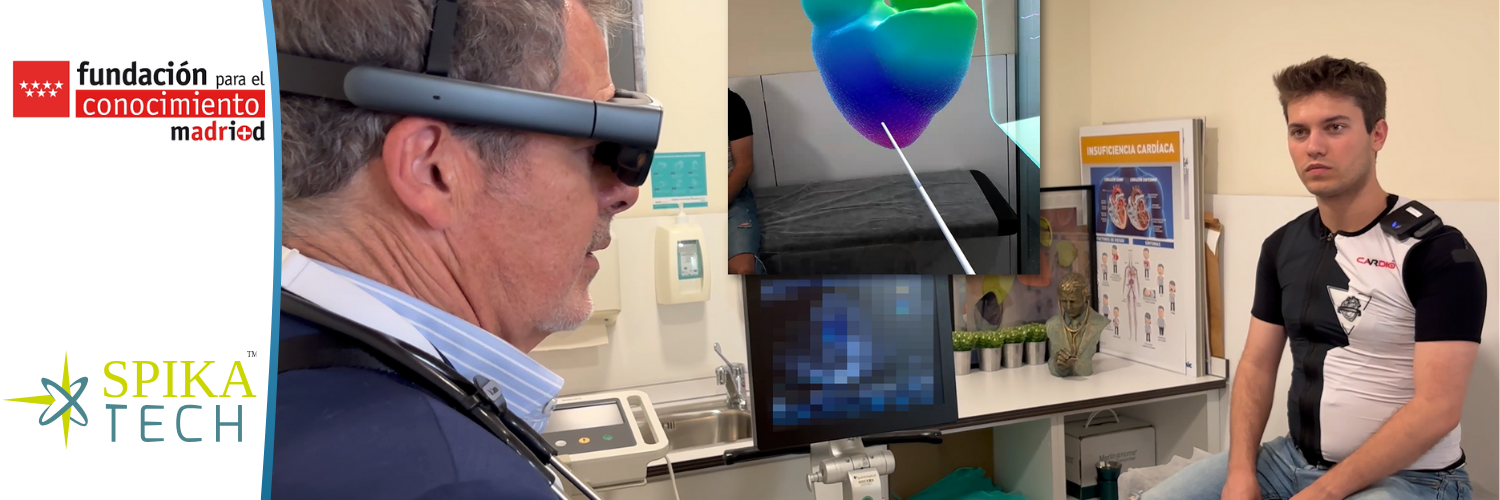
- Network partners
- Sector group
-
Healthcare
- Countries
-
SPAIN
When Carlos Zúñiga had a heart attack, his family rallied to his side. The assistance of his wife, Esther Arnaiz, and daughters, Alicia and Cristina Zúñiga, helped in his recovery, and their efforts and those of an additional family member, Victoria Vega Arnaiz, laid the foundations of an innovative company - managed by three women - aimed at improving cardiac arrhythmia diagnosis and treatment for countless patients.
This is the story of Spika Tech, a user-centric technology company in Spain whose flagship product, VR-CARDIO, allows clinical professionals to examine heart function without invasive catheterisation. Founded in 2015, Spika Tech began as a research laboratory at the University Rey Juan Carlos. The company has since become a leader in the design and development of custom software solutions with the help of the Enterprise Europe Network. Applications of their technology can also be used in multiple industries including health, telecommunications, aeronautics and defence.
Revolutionising cardiology with immersive technology
Detecting and treating arrhythmias is fundamental to cardiac care. Diagnosis typically relies on invasive catheterisation procedures. Spika Tech provides a new approach. According to Fernando Pozo, chief operating officer at Spika Tech: "VR-CARDIO allows for planning and decision-making before these interventions. Patients enter the operating room with a precise diagnosis, avoiding unnecessary interventions for those without arrhythmias. VR-CARDIO reduces operation time and increases precision during ablation procedures."
VR-CARDIO is a cardiac navigation system that allows medical providers a 360-degree view inside the heart. With a multidisciplinary approach, it relies on mixed reality, a technology that combines elements of the physical and digital worlds so that they can interact with each other via 3D holograms. This revolutionary innovation impacting personalised medicine can be seen in this Spika Tech video.
Regarding the use of this specialised system, Pozo said: "VR-CARDIO is designed for clinical professionals, offering a user-friendly and interactive interface. The clinical professional can start using the software with brief instructions and become familiar with its functionalities within a few hours."
The emergence of such a disruptive technology has not gone unnoticed. VR-CARDIO has received several awards and recognitions, including the Women Entrepreneurs Award (2021), the national and international QIA for Potential Innovation (2022) and the Health to Market prize, awarded by the European Institute of Innovation & Technology Health Spain and the Fundación Parque Científico de Madrid (2023).
From concept to commercialisation: Support for the market launch of VR-CARDIO
Spika Tech is a leader in innovative technology with a lauded product poised for introduction. Still, successful commercialisation poses many challenges. Funding to develop and scale up the product, compliance with regulations and certifications and the often slow process of market adoption by health organisations require financial support.
Assisting growing companies like Spika Tech is exactly the purpose of the Enterprise Europe Network. The Fundación para el Conocimiento madri+d and the Fundación Parque Científico de Madrid (FPCM) stepped in to help Spika Tech obtain the funding needed to launch VR-CARDIO. Representatives Reyes Sansegundo and Carmen Gilabert in particular, were always ready to offer their knowledge and experience.
A major target of the Network’s assistance was helping Spika Tech apply for a European Innovation Council (EIC) Accelerator grant. Reflecting on this process, advisers from Fundación para el Conocimiento madri+d shared: "We did it thanks to our EIC mentoring programme and the intense support of Reyes Sansegundo of Fundación madri+d, who is specialised in health technologies and innovations. We reviewed their full proposal before submission, and we prepared the whole directive team of Spika Tech with mock interviews before the real one in front of the EIC jury. The successful funding in the EIC Accelerator has been the kick-off for Spika Tech’s international visibility."
The Enterprise Europe Network assisted in Spika Tech’s evolution in other ways as well. Both the award from FPCM and the tailored support to produce communications content and further the media presence of Spika Tech helped to raise the visibility of the company and augment its reputation. Supported by Network coordinator Fundación para el Conocimiento madri+d, Spika Tech participated in the Madrid scale-up health programme for strategic growth solutions and elevating market presence, after which they were able to pitch the VR-CARDIO solution to business stakeholders in Europe, the US and South Korea. Network partners also facilitated direct communication between Spika Tech and healthcare providers in Spain.
In December 2022, Spika Tech was one of 90 companies out of 4 000 that applied to receive EIC funding. The company was awarded EUR 6 million, a huge boost enabling the realisation of Spika Tech’s ambitions. As Network partners from Fundación para el Conocimiento madri+d noted: "This huge success has led Spika Tech to an exponential growth in terms of internationalisation and size and has shortened their time to market. The company now has more than 30 staff members, they have been awarded with different international prizes and their technology has evolved for use in the defence sector, being part of four European Defence Fund projects."
Spika Tech is primed to continue growing and developing. With an eye to the future, Pozo said: "Our approach is based on identifying and anticipating market needs, providing solutions that not only solve current problems but also propel our clients into the future. With a clear focus on research and development, Spika Tech is moving towards creating technologies that transform how we live and work."
With specific reference to VR-CARDIO and the need for the funding to bring it to market, Pozo has a vision: "Less favoured countries will be able to achieve a higher and better level of preventive health care in treating arrhythmias, always with the mission of improving people's lives through technology."